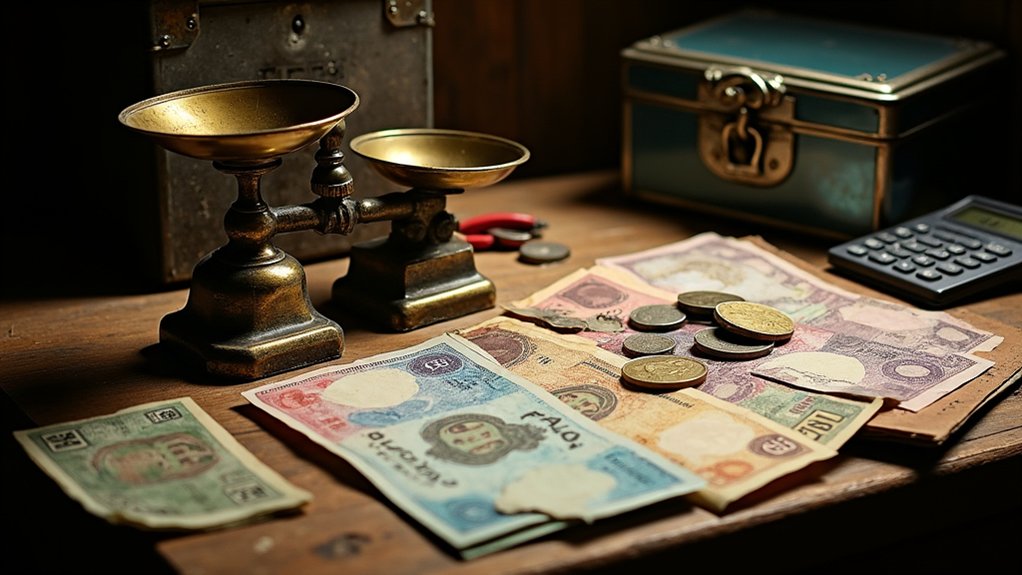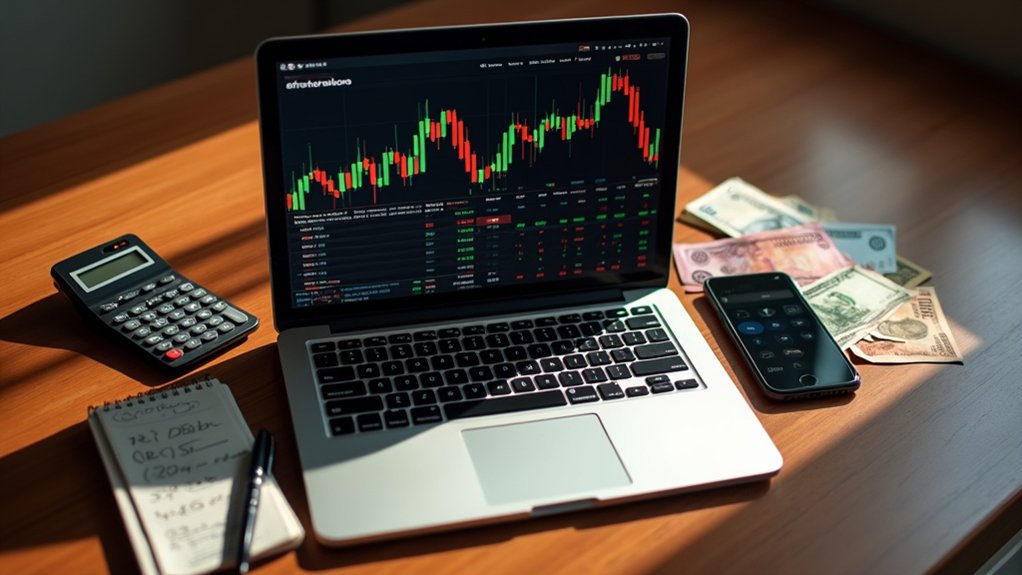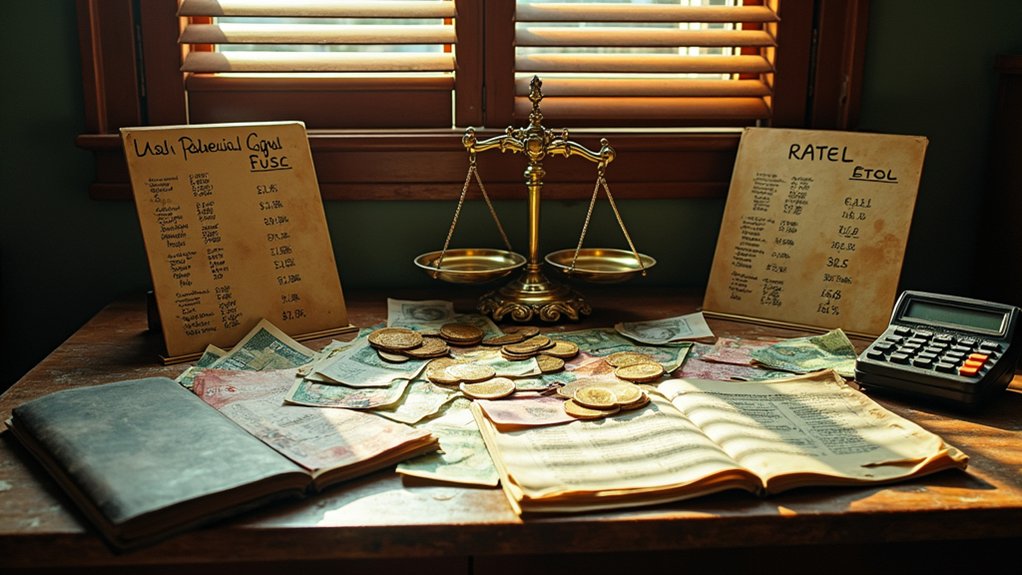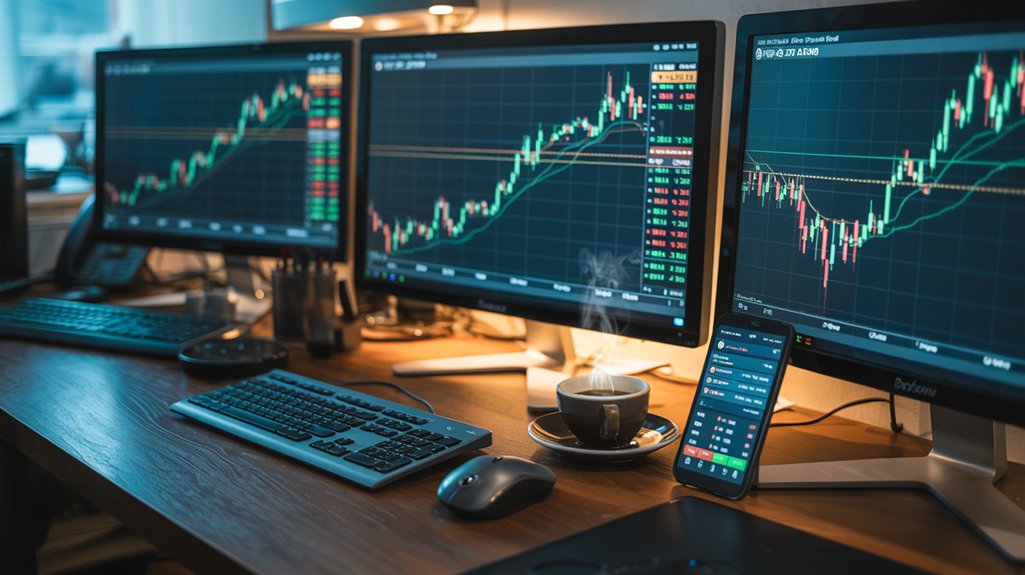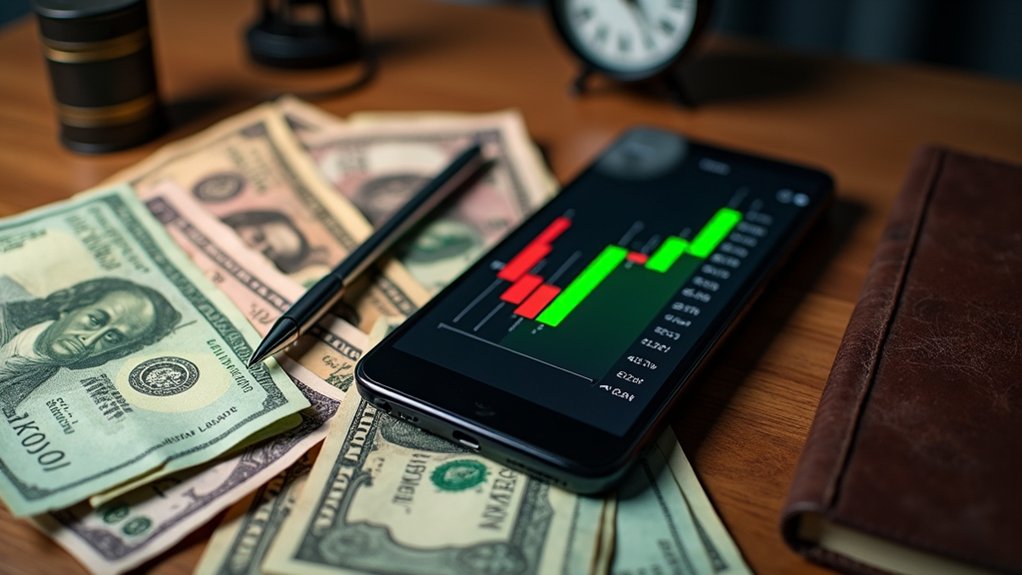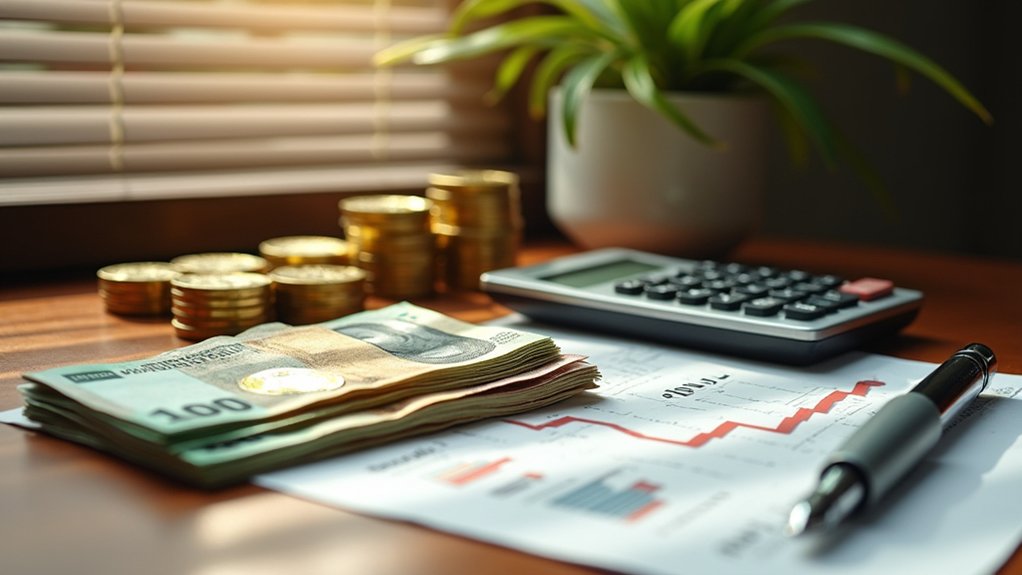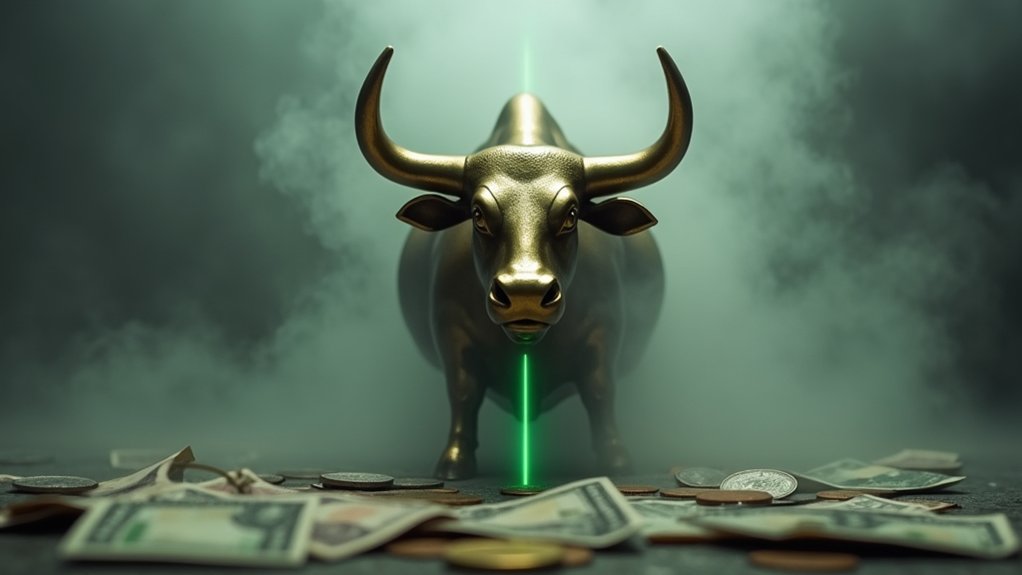Forex trading in Ghana isn't illegal, but it's not exactly legal either—there's no domestic regulatory framework for retail traders as of 2025. The SEC has been working on licensing systems since 2020, but concrete laws still don't exist. Traders use international brokers regulated by ASIC, FCA, or CySEC because there are zero locally licensed operators. The Bank of Ghana treats unlicensed dealings as “black market” activity, and scams are rampant. The details get messier from here.
Quick Facts That Matter
- Retail forex trading exists in a regulatory vacuum; no explicit law governs it, though SEC is developing licensing requirements for future implementation.
- No locally regulated brokers operate in Ghana; traders rely on international platforms regulated by ASIC, FCA, or CySEC instead.
- Trading requires internet access, margin accounts with offshore brokers, and platforms like MT4 or MT5 for executing currency pairs.
- Bank of Ghana classifies unlicensed dealing as illegal “black market” activity, with strict penalties including fines, seizures, and criminal prosecution.
- Electronic withdrawals incur 5% fees from August 2025; travelers must declare amounts over $10,000 or face asset seizure and charges.
Overview: Forex Trading in Ghana
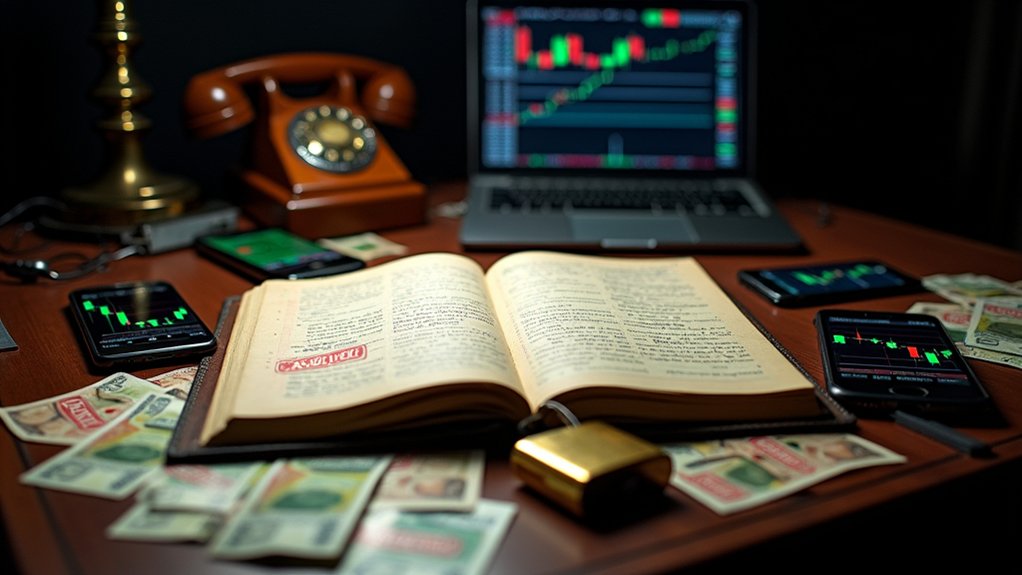
In the shadow of tightening regulations, Ghana's retail forex trading landscape is undergoing a dramatic transformation. The Securities and Exchange Commission is building a thorough regulatory framework from scratch. They're rolling out trader licensing systems and short code verification tools to separate legitimate operators from scammers. Because apparently, that distinction wasn't clear enough before. The SEC's Acting Deputy Director-General has already made formal announcements. This isn't speculation anymore—the regulatory wheels are turning.
Meanwhile, the Bank of Ghana is cracking down hard on unlicensed forex dealings, slapping them with the “black market” label. The Bank of Ghana also intervenes directly in the foreign exchange market using monetary policy tools to stabilize the national currency. Violations mean seized funds, fines, and criminal prosecution under the Foreign Exchange Act 2006. License suspensions are already happening. Travellers carrying above $10,000 in foreign currency must now file full declarations on the official FX-5 form, with even stricter documentation requirements kicking in at the $50,000 threshold. The message is blunt: play by the rules or don't play at all.
Is Forex Trading Legal in Ghana?
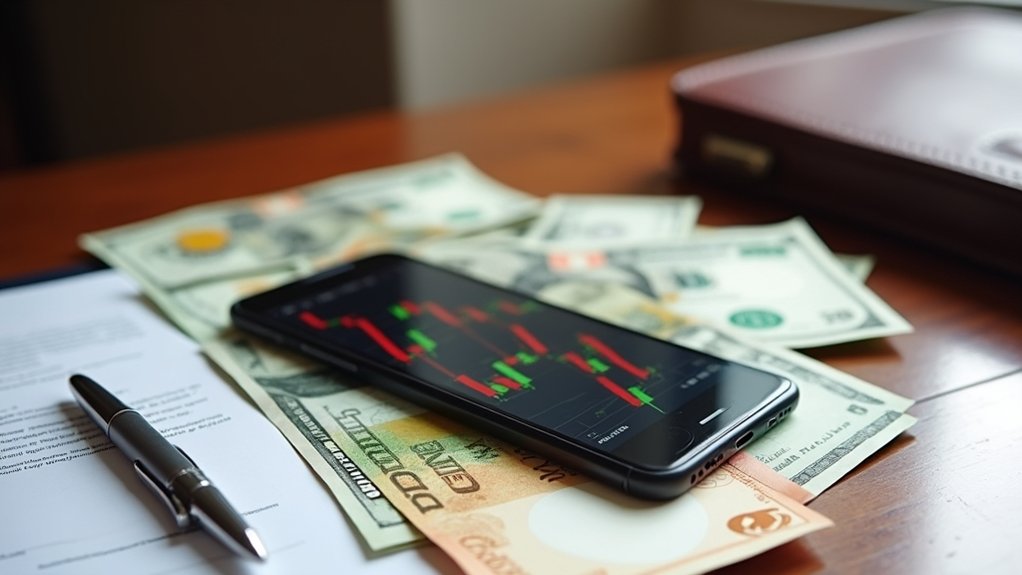
Retail forex trading sits in a peculiar legal gray zone in Ghana—it's not illegal, but it's not exactly regulated either. No law explicitly bans it. No law explicitly governs it. Traders simply access international platforms—MT4, MT5, whatever—and the government hasn't said no.
But here's the catch: there's no domestic regulatory framework. The Bank of Ghana regulates forex bureaus, not retail traders clicking buy and sell on their phones. Zero formal oversight. Zero licensed local brokers required.
The SEC has been developing guidelines since 2020, working on licensing systems and broker verification protocols. Full regulation is “expected soon.” But for now? It's a regulatory vacuum. Legal, yes. Protected? Not remotely. Traders operate in a permissible-but-unregulated limbo. Meanwhile, the BOG has rolled out a Regulatory Sandbox framework to test fintech innovations under controlled conditions, though this applies to payment systems rather than retail trading platforms. Unlike neighboring Kenya, where the central bank actively intervenes through monetary policy tools to stabilize the forex market, Ghana's approach remains largely hands-off.
Who Regulates Forex Trading in Ghana?
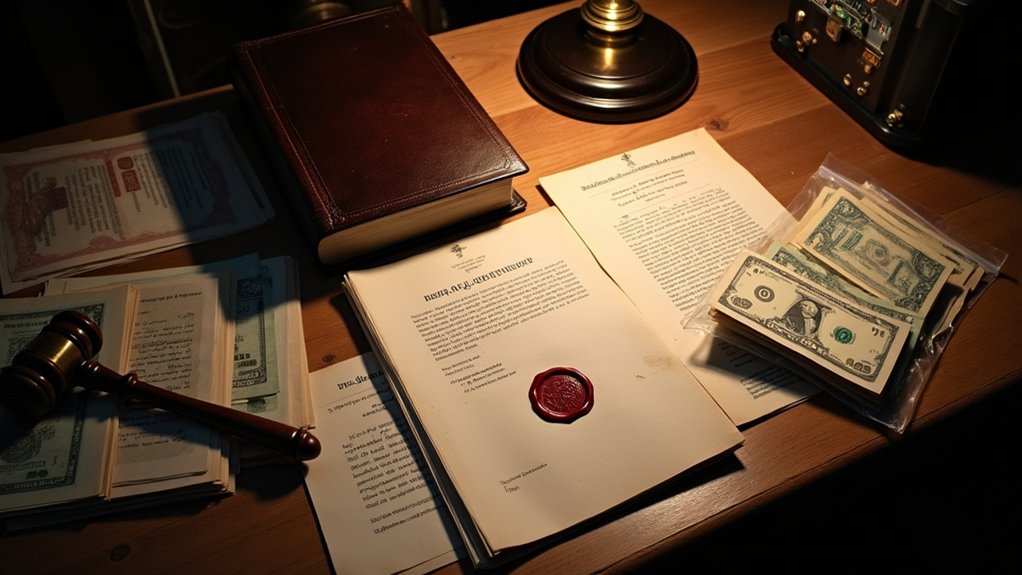
Who's actually in charge here? Good question.
Ghana's forex market exists in a regulatory gray zone—technically permitted but practically unprotected, with oversight still under development.
The Bank of Ghana authorizes fifteen forex brokers for the Ghana Interbank Forex Market as of January 2025, but that's institutional stuff—banks and big players.
For regular retail traders? Nobody, really. The Securities and Exchange Commission is developing guidelines and planning a licensing system, and they've even confirmed progress publicly in 2025. But right now, concrete laws targeting retail forex don't exist. It's a regulatory vacuum.
Traders operate in this weird legal gray zone—permitted but unprotected.
No licensed local brokers available, so everyone uses international platforms regulated by ASIC, FCA, or CySEC instead.
Many traders focus on the USD/GHS currency pair when participating in the forex market, given its direct relevance to local currency exposure.
Change is coming, supposedly. Licensing, oversight, the works. But today? You're mostly on your own.
How Forex Trading Works in Ghana

For anyone curious about forex trading mechanics on the ground in Ghana, here's the reality: it all starts with an internet connection and a device. Computer, smartphone, tablet—pick your weapon.
From there, traders research brokers accepting Ghanaian clients, open margin accounts, and deposit funds using whatever payment methods the broker allows. Then comes platform access. MT4, MT5, proprietary apps—doesn't matter much.
The actual trading? Pure currency conversion. Buy one currency, sell another. Predict right, pocket the difference. Predict wrong, eat the loss. A trader might grab USD/GHS at 5.80, hoping to offload at 5.85. Or watch it sink to 5.75 and curse quietly.
Strategies vary wildly: scalping for tiny pips, day trading to dodge overnight risk, swing trading momentum waves, chasing news spikes. The spot market handles the highest volume because transactions settle immediately. Understanding platform regulations matters too, since different markets enforce varying rules around leverage limits and broker licensing.
Best Time to Trade from Ghana
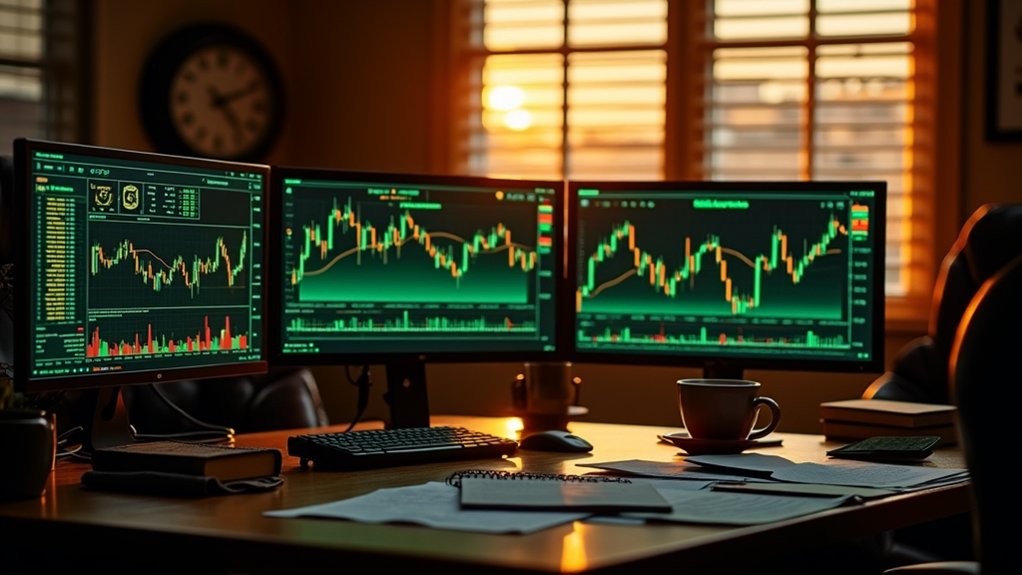
The New York session continues from 13:00-21:00 GMT, stretching actionable hours into Ghana's evening. USD pairs dominate here.
Tokyo (00:00-08:00 GMT) and Sydney (21:00-05:00 GMT) sessions offer calmer waters for those who prefer stability over chaos. Lower volatility, fewer participants. The forex market runs 24/5, but not all hours deliver equal opportunity. Understanding how time-of-day shapes volatility helps traders in Ghana identify when currency pairs are most responsive to market-moving events. Overlap periods win.
Payments, Deposits and Withdrawals in Ghana
Moving money in and out of a forex account from Ghana isn't the nightmare it was a decade ago.
Mobile money, internet banking, digital wallets, even USSD—they all work. Most brokers accept multiple base currencies: USD, EUR, GBP, AUD, CAD, ZAR, AED. Card and e-wallet deposits? Instant. Bank wires? Up to five business days, naturally.
Withdrawals get processed within one business day by most brokers, then it's the usual wait: cards and e-wallets deliver fast, bank transfers take up to five days. No fees if you're moving more than $20. Below that threshold, fees apply.
Some brokers let traders start with $10 to $50 minimums. When choosing how to move funds, traders should evaluate secure payment methods like bank transfers, credit cards, e-wallets, and cryptocurrencies based on speed, fees, and safety. Digital payments in Ghana are growing nearly 15% annually. The region now hosts the world's largest-growing mobile money market. Crypto's creeping in too.
Taxes, Reporting and Money Rules in Ghana
Ghanaian forex traders juggle more paperwork than most people realize. The Foreign Exchange Act, 2006 (Act 723) and Anti-Money Laundering Act, 2020 (Act 1044) create a web of reporting requirements that catch everyone eventually. Carrying over $10,000 abroad? Declaration time. Importing currency? Better have those endorsed forex bureau receipts, bank slips, and Import Declaration Forms ready.
Banks must submit detailed utilization reports for every foreign currency withdrawal lacking physical cash backing. The 5% withdrawal fee on electronic transfers hit in August 2025, exempting only direct cash deposits. The Bank of Ghana now conducts twice-weekly open auctions for licensed commercial banks under revised foreign exchange intermediation measures. False declarations mean seized funds, fines, or criminal charges. No exceptions.
The Securities and Exchange Commission is developing thorough forex trading guidelines, requiring all traders to obtain licenses. Understanding the Ghanaian Cedi's exchange rate drivers helps traders navigate these regulatory requirements more effectively. Black market dealings remain strictly prohibited.
Forex Trading Scams and Risks in Ghana
Everywhere you look online, someone's getting fleeced. Ghana's forex scene crawls with scammers running Ponzi schemes disguised as legitimate platforms. Social media overflows with overnight millionaire fairy tales. Fake mentors promise guaranteed returns—classic red flag. The SEC is scrambling to build a regulatory framework, complete with verification short codes to help people spot genuine firms.
Right now? No locally regulated brokers exist. Zero. Credible international operators answer to the FCA or CFTC, but unverified outfits manipulate prices and block withdrawals. If you encounter a broker blocks withdrawal, contact them immediately in writing, file complaints with their regulator if they have one, and consider legal action to recover your funds. Watch for brokers pushing PAMM accounts or binary options with absurd profit claims. No SSL certificate on a trading site? Run. The Bank of Ghana keeps warning people about fraudsters pretending to be foreign investors. These scams typically involve promises of high sums in exchange for upfront payments or personal information. The market's volatile enough without getting scammed.
Quick Q and A
Can I Trade Forex Part-Time While Keeping My Regular Job in Ghana?
Yes, part-time forex trading is feasible alongside regular employment in Ghana. London and New York trading sessions align well with after-work hours, while early morning Tokyo sessions accommodate pre-work trading opportunities for employed individuals.
What Internet Speed Do I Need for Forex Trading in Ghana?
A minimum of 3 Mbps supports basic forex trading, though 20 Mbps is standard for most traders. However, 100 Mbps is recommended for peak 2024 performance, particularly when using multiple platforms or executing algorithmic strategies simultaneously.
Do Ghanaian Brokers Offer Better Conditions Than International Offshore Brokers?
No. Ghanaian brokers face significant trading restrictions, including prohibitions on proprietary trading, holding forex positions, and competitive spread pricing. International offshore brokers typically offer better leverage, platforms, spreads, and stronger regulatory client protections.
Can I Open a Forex Account With Mobile Money Only?
Most international forex brokers do not accept mobile money for account opening or funding. However, some brokers partnering with Ghanaian payment providers may allow MTN Mobile Money or Vodafone Cash deposits, though verification documents remain mandatory regardless of payment method.
What Happens to My Funds if My Broker Goes Bankrupt?
Ghana's regulatory framework does not explicitly detail forex client fund segregation or compensation schemes. If a broker becomes insolvent, trader funds may be at risk, as demonstrated by Consolidated Bank Ghana's 2024 license suspension without clear client protection mechanisms.
The Bottom Line
Forex trading in Ghana exists in a gray zone—legal but barely regulated, accessible but risky. Traders can open accounts, deposit cedis, and chase pips on MetaTrader platforms. But there's no local regulatory safety net. Scams proliferate. Tax rules exist on paper but enforcement is murky. The mechanics work, sort of. The protections don't. Anyone diving in should know they're largely on their own. That's the reality. Not exactly reassuring, but there it is.
